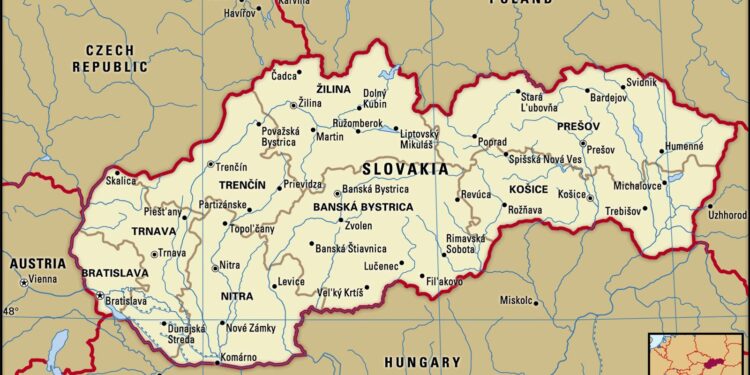Slovakia is reportedly on the verge of finalizing a significant agreement with the United States for Westinghouse Electric Company to construct a new nuclear reactor, Prime Minister Robert Fico announced. The deal marks a strategic move to diversify Slovakia’s energy sources and reduce reliance on Russian technology amid ongoing geopolitical tensions. This development aligns with broader European efforts to enhance energy security and transition to low-carbon power generation.
Slovakia Advances Nuclear Energy Ambitions with Westinghouse Partnership
Slovakia is on the cusp of a significant milestone in its energy sector, as Prime Minister Robert Fico revealed ongoing negotiations with the United States to secure a deal with Westinghouse Electric Company. The agreement aims to boost the country’s nuclear energy capacity through the construction of a state-of-the-art nuclear reactor. This collaboration would mark a pivotal shift in Slovakia’s energy policy, emphasizing diversification and sustainable power sources amid growing European energy security concerns.
The planned reactor is expected to bring several key benefits to Slovakia’s energy landscape:
- Enhanced energy independence: Reducing reliance on traditional fossil fuels and external suppliers.
- Advanced technology integration: Incorporation of Westinghouse’s latest nuclear innovations, promoting safety and efficiency.
- Economic growth stimulation: Job creation and increased investment during the construction and operational phases.
| Project Aspect | Details |
|---|---|
| Partner | Westinghouse Electric Company |
| Project Scope | New Nuclear Reactor Build |
| Expected Completion | Mid-2030s |
| Strategic Goals | Energy Security & Emissions Reduction |
Prime Minister Fico Details Strategic Benefits and Economic Impacts of the Deal
Prime Minister Robert Fico highlighted that forging a partnership with Westinghouse marks a pivotal advancement for Slovakia’s energy independence and economic stability. The deal is expected to enhance the country’s energy security by diversifying its nuclear fuel sources and reducing reliance on Russian supplies. Fico emphasized that this collaboration will not only ensure a steady and sustainable power supply but also support the national commitment to lowering carbon emissions in line with EU climate goals.
The economic implications are equally significant, promising a substantial boost in local employment and technological innovation. Key benefits outlined include:
- Job creation: Thousands of direct and indirect jobs during construction and operation phases.
- Technological upgrade: Transfer of advanced nuclear technology and know-how to Slovakia.
- Investment inflow: Increased foreign investment supporting related industries in the region.
- Energy affordability: Long-term stabilization of energy prices through domestic nuclear production.
| Economic Factor | Projected Impact |
|---|---|
| Employment | +3,000 jobs (2025-2035) |
| Investment Value | €2.5 billion |
| Energy Cost Reduction | Up to 15% by 2040 |
| Carbon Emissions Cut | 20% reduction by 2035 |
Recommendations for Ensuring Regulatory Compliance and Sustainable Project Development
Ensuring adherence to regulatory frameworks and fostering sustainable project development is paramount when embarking on large-scale nuclear energy collaborations such as the prospective Westinghouse reactor in Slovakia. Key measures include early engagement with regulatory bodies to align project objectives with national and international safety standards. Additionally, implementing transparent environmental impact assessments not only mitigates risks but also builds public trust. Robust monitoring systems and clearly defined contingency plans are essential for maintaining compliance throughout the project lifecycle.
Integrating sustainability requires a multidimensional approach, prioritizing both ecological preservation and community welfare. Stakeholders should adopt best practices such as:
- Utilizing advanced reactor technologies that minimize nuclear waste production
- Deploying renewable energy integration strategies alongside nuclear deployment
- Offering continuous training and capacity-building programs for local workforce
- Ensuring open, ongoing communication with residents and civic groups
| Compliance Aspect | Recommended Action |
|---|---|
| Licensing & Permits | Coordinate early with nuclear regulatory authority |
| Environmental Safety | Conduct comprehensive impact studies |
| Community Engagement | Host public forums and feedback sessions |
| Workforce Development | Partner with educational institutions for training |
Final Thoughts
As Slovakia moves closer to finalizing its agreement with the United States and Westinghouse to construct a new nuclear reactor, the deal marks a significant step in the country’s efforts to diversify its energy sources and enhance its energy security. Prime Minister Robert Fico’s announcement underscores Bratislava’s strategic pivot toward stronger transatlantic cooperation amid broader European energy challenges. Further details and formal confirmations are expected in the coming weeks as negotiations conclude.
















